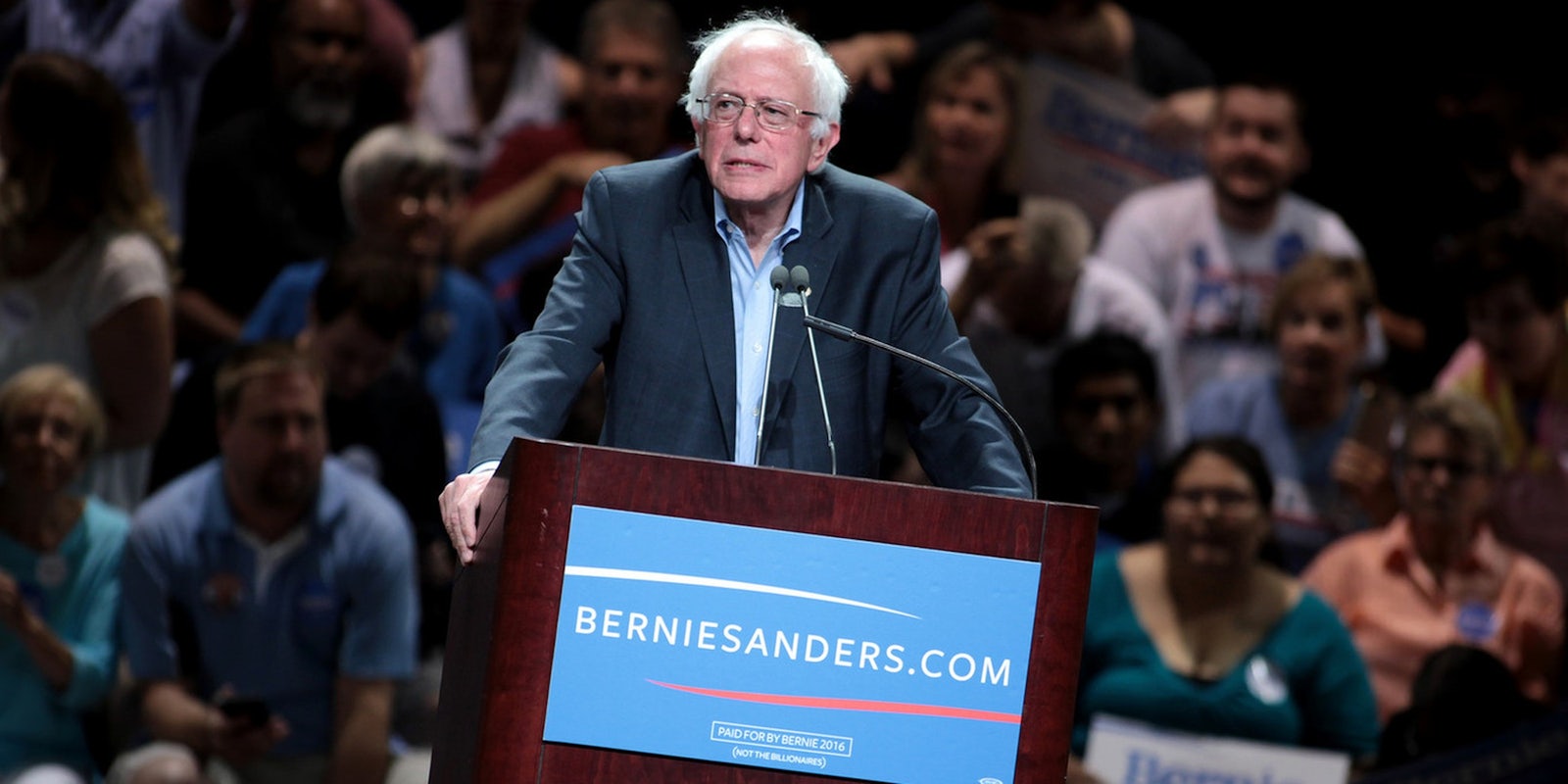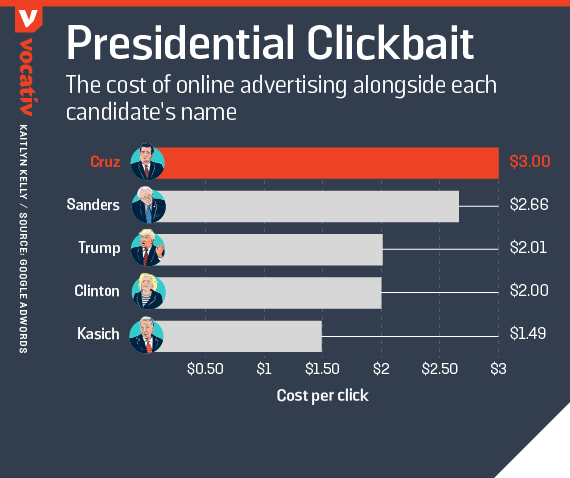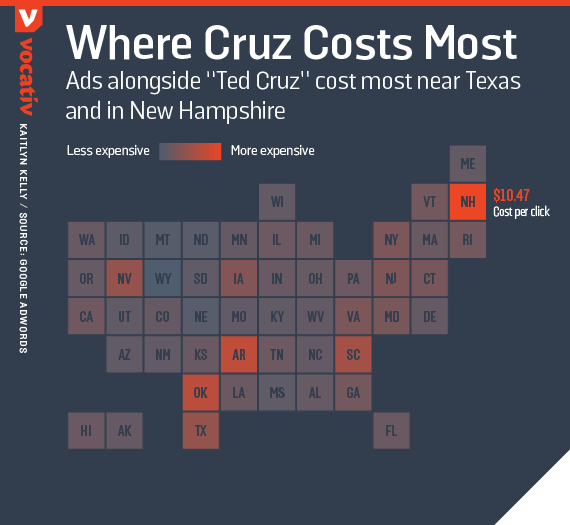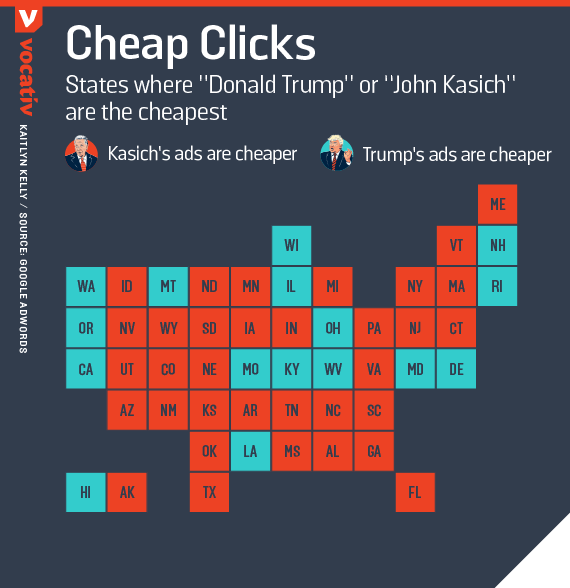It will cost you more to run an online ad beside “Ted Cruz” than beside the name of any other presidential candidate, a Vocativ analysis has found. The gorp-faced Trump-chaser earns Google an average of three U.S. dollars per advertising click when his name is used by advertisers as a keyword—double what you’ll pay to advertise against “John Kasich.”
Google’s commercial AdWords portal is where businesses decide how to target online ads to users of Google’s services. Decisions made here determine what ads you see on YouTube videos, in promoted searches, and wherever Google ads appear on other people’s sites.
So, say someone (a PAC, a journalist, or event regular human) shoots a video from the election trail on their phone. They upload it to YouTube, and add the keywords “Ted Cruz” into the metadata, and enable monetization, which basically says “I’m happy for ads to run on this video.” You, the advertiser, have already bid to place your ad on videos that contain “Ted Cruz”. The Google–YouTube ad team syncs your request with videos tagged with “Ted Cruz,” and a match is born. If someone clicks through that ad, you pay the relevant Cost Per Click (CPC). For “Ted Cruz”, that varies from 98 cents in Wyoming to $10.47 in New Hampshire.
The phrase “Ted Cruz” costs 50 percent more per click than “Donald Trump” or “Hillary Clinton” on average, with Trump a single cent more expensive than Hillary in ad-click terms ($2.01 to her $2.00). “Bernie Sanders” sits in the middle at an average of $2.36 per click, with bargain-basement status afforded to presidential hanger-on “John Kasich”—the cheapest presidential search term on the menu.
We determined the cost-per-click for each candidate by looking at the price suggested by the Google Adwords system to help advertisers choose preferred keywords or phrases which decide where their ads should appear. The system shows them how much it costs them if a user clicks on the ad, based on the locations the advertiser wants to target a and variety of other metrics.
If you compare all the names of the remaining presidential candidates as advertising keywords, “Ted Cruz” is the most expensive phrase in 42 states. “John Kasich” is the cheapest search term in 35 states, with Donald Trump the only candidate cheaper than Kasich in any states (“Donald Trump” is the cheapest search term in 15 states.) John Kasich’s name holds the least value for advertisers—on average, he’s 50 cents cheaper to advertise beside than “Hillary Clinton,” and fails to draw more than a buck per click in 19 of the 35 states where he’s the cheapest. Ads alongside “Hillary Clinton” are only more expensive than “Bernie Sanders” in South Dakota. Nowhere else.
Is the cost of a click an accurate way to measure how people value the candidates for next president? ¯_(ツ)_/¯ Is any data worthwhile when it comes to measuring entirely subjective, human desires? Probably not. But that doesn’t prevent us from craving it.
The cost per click is a measure of value that Google places on the match between a keyword and an ad. Because it varies from state to state, we can tell roughly how valuable that candidate’s name seems to be in each location. That value is influenced heavily by competition for that advertising slot, so you can gauge, loosely, how many businesses or other advertisers want to associate themselves with that keyword/presidential candidate.
But here’s the interesting thing—Google ads are also partly a judgement on you, the person who’s doing the clicking. Clicks on ads associated with “John Kasich”- or “Donald Trump”-related content are cheaper, generally, because there’s less competition for them. That’s partly because the people likely to click on those ads are seen as less valuable people in the eyes of advertisers. Kasich-clickers are less likely to spend. They are likely to be in a lower socioeconomic bracket. Google Ads thinks Cruz-clickers, on the other hand, are more likely to be affluent, more valuable consumers, a label which tallies loosely with his status as the Republican establishment candidate, or at least what passes for one in this election.
The final bit of context, however, is that candidates’ names as keywords are, on the grand scale of advertising keywords, pretty unpalatable. There’s little commercial gain from harnessing them. The big-money keywords are all related to search terms typed into Google when you actually want to pay for something. Searching for a lawyer in Manhattan? People really want to advertise beside those results. “Slip and fall attorney” is a keyword phrase that will cost you $260 per click as an advertiser. Search terms related to car insurance cost in the region of $180. If advertising beside Ted Cruz’s name only costs $3, not many people are buying whatever he’s selling.





